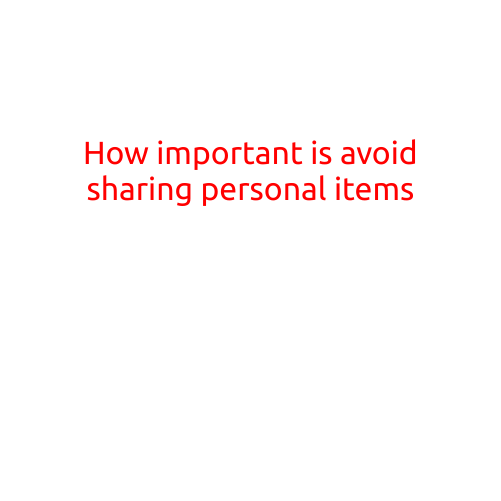
How Important is Avoiding Sharing Personal Items?
In today’s busy world, sharing items with others seems like a convenient and eco-friendly way to reduce waste. However, sharing personal items can have unforeseen consequences on our health, relationships, and overall well-being. In this article, we’ll explore the importance of avoiding sharing personal items and discuss some practical tips on how to do so.
Health Risks
Sharing personal items can pose a significant risk to our health, especially when it comes to hygiene and sanitation. For instance, sharing makeup, hairbrushes, or towels can spread diseases like ringworm, herpes, and even COVID-19. Additionally, pathogens like bacteria, viruses, and fungi can be transferred from one person to another through shared items, leading to infections and illnesses.
Emotional Distress
Sharing personal items can also have emotional consequences. When we lend or give away items that hold sentimental value, we may experience feelings of attachment, loss, or even betrayal. For example, sharing a family heirloom or a loved one’s personal belongings can stir up negative emotions and memories. Furthermore, borrowing someone else’s items can lead to feelings of obligation or guilt, potentially straining personal relationships.
Boundary Issues
Sharing personal items can blur the lines of personal boundaries, leading to feelings of invasion or disrespect. When we share intimate or personal belongings, we may inadvertently convey a lack of respect for the other person’s personal space. For instance, sharing a partner’s personal grooming items or intimate clothing can undermine trust and create tension in the relationship.
Practical Tips for Avoiding Shared Items
To minimize the risks and consequences of sharing personal items, consider the following practical tips:
- Set boundaries: Establish clear rules and guidelines for sharing personal items with family, friends, and partners.
- Label and organize: Label and organize your belongings to maintain a sense of control and order, making it easier to keep track of what’s yours.
- Create a ‘no-sharing’ policy: Implement a ‘no-sharing’ policy for items that are particularly personal or valuable, such as jewelry, heirlooms, or intimate clothing.
- Practice good hygiene: Wash your hands frequently, use sanitizer, and maintain a clean living space to reduce the risk of spreading diseases.
- Communicate openly: Have open and honest conversations with others about what you’re comfortable sharing and what you’re not.
- Respect others’ boundaries: Respect the boundaries of others and don’t push them to share personal items they’re not comfortable with.
Conclusion
Sharing personal items may seem like a harmless act of kindness, but it can have far-reaching consequences for our health, relationships, and emotional well-being. By establishing clear boundaries, communicating openly, and respecting others’ personal space, we can avoid sharing personal items and maintain a sense of control and autonomy over our belongings. Remember, respecting personal boundaries is essential for maintaining healthy and meaningful relationships with others.





